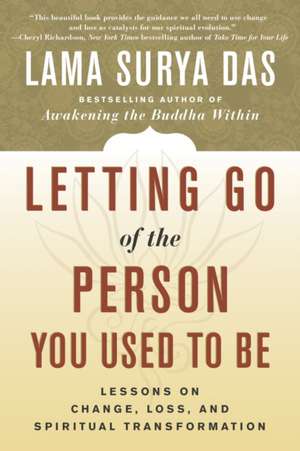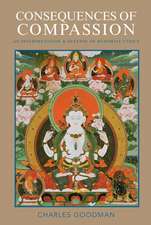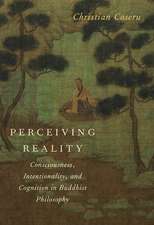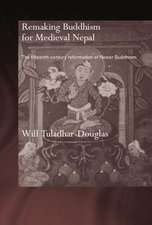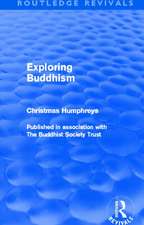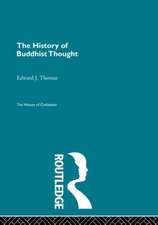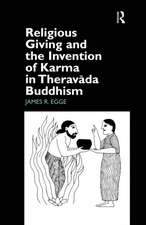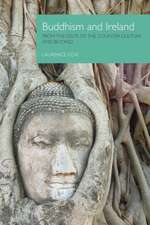Letting Go of the Person You Used to Be: Lessons on Change, Loss, and Spiritual Transformation
Autor Lama Surya Dasen Limba Engleză Paperback – 31 iul 2004
lively universal teaching style has awakened the spirituality of thousands, now shares an enlightened approach to change and loss, dealing with difficult emotions such as fear, grief, and anger, and the role of crisis in uncovering our authentic selves.
For many people, recent years have been characterized by profound change, whether it relates to financial upheaval, political shifts, or even massive losses of life to disease and violence. Even on the personal level each person must confront the curves life throws his or her way. Buddhism has a great deal to say about change and impermanence and how to meaningfully deal with it. Change--whether on a large or small scale--provides our most important opportunity for learning about ourselves and the nature of reality. From this essential insight Lama Surya Das has crafted a fulfilling and important path to understanding and healing ourselves and finding peace.
Full of personal stories, anecdotes, practical exercises, guided meditations and reflections, and pithy original aphorisms, Letting Go of the Person You Used to Be addresses life's most universal difficulties in a way that is accessible to all. By using memorable concepts such as The Virtues of Adversity, The Pearl Principle ("No inner irritation, no pearl"), and Gaining through Loss, Surya reminds readers that hiding from change and loss is futile. Learning to consciously accept and embrace change leads to a better understanding of ourselves and our own innate divine light.
Preț: 98.21 lei
Nou
Puncte Express: 147
Preț estimativ în valută:
18.79€ • 20.10$ • 15.67£
18.79€ • 20.10$ • 15.67£
Carte tipărită la comandă
Livrare economică 17 aprilie-01 mai
Preluare comenzi: 021 569.72.76
Specificații
ISBN-13: 9780767908740
ISBN-10: 0767908740
Pagini: 240
Dimensiuni: 140 x 210 x 14 mm
Greutate: 0.27 kg
Ediția:Trade Pbk.
Editura: HARMONY
ISBN-10: 0767908740
Pagini: 240
Dimensiuni: 140 x 210 x 14 mm
Greutate: 0.27 kg
Ediția:Trade Pbk.
Editura: HARMONY
Notă biografică
A voice of clarity in difficult times, Surya Das offers timeless wisdom in a timely message of hope helpful for us today and tomorrow.
An authorized lama in the Dzogchen lineage of Tibet, SURYA DAS is a sought-after spiritual teacher and meditation master, poet, and spokesperson for the emerging American Buddhism. Founder of the Dzogchen Center, he is also the author of several popular books, including Awakening the Buddha Within, Awakening to the Sacred, and Awakening the Buddhist Heart, which comprise his bestselling Awakening Trilogy, the first trilogy of Buddhism for the West. He also writes regularly for Tricycle magazine and Beliefnet.com, is active in interfaith dialogue, and is a founder and board member of several Buddhist monasteries, centers, and charitable projects in refugee camps in Asia and the West. He lives outside Boston, Massachusetts.
An authorized lama in the Dzogchen lineage of Tibet, SURYA DAS is a sought-after spiritual teacher and meditation master, poet, and spokesperson for the emerging American Buddhism. Founder of the Dzogchen Center, he is also the author of several popular books, including Awakening the Buddha Within, Awakening to the Sacred, and Awakening the Buddhist Heart, which comprise his bestselling Awakening Trilogy, the first trilogy of Buddhism for the West. He also writes regularly for Tricycle magazine and Beliefnet.com, is active in interfaith dialogue, and is a founder and board member of several Buddhist monasteries, centers, and charitable projects in refugee camps in Asia and the West. He lives outside Boston, Massachusetts.
Extras
Chapter One
Making Sense of the Madness
Why does God allow guns? Why did Jonathan's daddy have to die? Why was Margaret born blind?
Amelia,
four years old
Why is there illness, death, and suffering? Why are we separated from those we love? Why is there pain? Why do bad things happen? Why do people hurt each other? Why is life so filled with loss? And the universal question: Why do bad things happen to me? Stuff happens--everyone knows that--but why does it happen to me, why am I so often in the midst of it!
No one has fully satisfactory or verifiable answers to any of these questions. We don't really know. This is part of the great mystery of life. Sure, there are many possible theories and explanations. I have friends, for example, who are astrology buffs. They say that the world events that began on September 11, 2001, were put in motion by an opposition between the planets Pluto and Saturn. It was written in the stars.
Some people are adamant about personifying evil. When we look around us we see leaders from all persuasions referring to those who disagree with them as being evil and followers of the devil. There are men and women who blame everything on Satan himself, who they envision as a real, albeit unseen, entity, who malevolently waltzes through our world, taking advantage of our weaknesses, which of course causes all varieties of havoc. I picked up the newspaper one day last year and read a statement from a fundamentalist preacher who said that some of our most serious problems are well deserved and come about because we are sinners with questionable sexual proclivities. This kind of simplistic fundamentalism has never had much appeal for me. It doesn't even make sense. In fact I think it is a crock, and I don't mind saying so.
Schopenhauer, one of my favorite philosophers, said: "Life is endless pain with a painful end." But is that all, I wonder? It's a sad and frustrating fact that much of the time we can't make sense of the unhappiness of our lives. Some events are easy to comprehend and can be directly attributable to cause and effect. We drive carelessly, for example, and we have accidents. This makes sense. But random events do occur, and cautious people are also in serious accidents. Cautious people are driving in the wrong place at the wrong time; cautious people are also hurt. Things happen that don't seem fair. Why? Are there underlying explanations for this? If I were to answer this question, I would have to say-- probably. Everything has a cause or causes, but I certainly don't always know what they are. Nor do I think that anyone else does. The reasons why we are hurt by life are often as mysterious as the reasons why we are graced with beauty and joy. This all belongs in the category of the unknowable. Much in the universe is inscrutable and unfathomable. Omniscience would help us grasp these matters, but it is in short supply in the human realm.
I am a Buddhist and, as such, I accept the reality of karma and the law of cause and effect. It makes good sense to me. But I also know that the laws of karma are far more complex than any simple sitcom version. We are living not only with our own personal karma, but also with the karma of every other being we meet. When my karma meets your karma, something happens. And, of course, it isn't only about individual karma; there is group karma as well. In this speeded-up world, where we have access to the CNN crawl and minute-by-minute news broadcasts from around the world, think about the karmic repercussions. Shooting breaks out between Israelis and Palestinians on the West Bank. A traumatized tourist with a video camera gives the footage to CNN. It is on the air within the hour. Someplace in Montana, a young mother, making a peanut butter and jelly sandwich for her five year old, is watching. She gets so upset that she drops the jar of jelly, which crashes to the floor. Her barefoot little girl walks in the kitchen at that moment and cuts her toe. More blood flows. How is this all karmically connected? It's impenetrable to mere mortals. "The beauty of the world has two edges, one of laughter, one of anguish, cutting the heart asunder." Virginia Woolf said that.
Only omniscient awareness can totally comprehend causation with all its details, interconnections, and ramifications. The Buddha said that only an omniscient Buddha, a perfectly enlightened and fully awakened being, could understand the myriad causes and conditions that bring about the color of a single peacock's feather.
Since we are not omniscient, since we have limited view and weak foresight, we don't know exactly why things happen. However we do know that it is impossible to avoid all of life's negative experiences. Recently I was standing in a corner coffee shop, waiting at the cash register to pay my bill when a distraught couple came into the restaurant. Both the man and the woman were very excited and talking rapidly. They reminded the cashier that when they left the restaurant about an hour earlier, they had been accompanied by their eighteen-month-old toddler. At the time the little boy had been clutching his favorite stuffed animal--a small purple cow. Whey they arrived home and tucked the sleeping child into his crib, they discovered that he had loosened his grip on his furry toy. Now the purple cow was missing! What could have happened to it?
The couple had hastily arranged for a neighbor to stay with the child, and they were now frantically retracing their footsteps in an attempt to recover the cherished toy. They were hoping against hope that someone had turned it in to the restaurant cashier.
"He's going to be so upset when he wakes up and finds that it's gone!" the father said.
"He loves that cow! He never goes anywhere without it. I knew I should have tried to find another one to buy just in case this happened," the mother said.
"I should have been paying more attention," the father blames himself. "How could I have let this happen?"
The cashier queried various employees. Everyone was very sympathetic. Who hasn't lost something precious and beloved? Who doesn't identify with the pain of childhood losses? Who couldn't empathize with these doting parents who wanted to spare their toddler the pain associated with loss?
More than 2,500 years ago in ancient India, on the border of what is now Nepal, there was another parent who wanted his child to live a pain-free life. His name was King Suddhodana, and he was the father of the man, born as Siddhartha, who we now know as Gautama, the Buddha. Suddhodana was a powerful leader, wealthy enough to build a walled castle filled with flower gardens, elegant food, gracious furnishings, beautiful music, and great luxury.
Legend has it that before Siddhartha, the child who was to become the Buddha, was born, his mother had a dream: She saw her son as a great spiritual warrior, a radiant Bodhisattva who was transformed into a white elephant. The elephant climbed a golden mountain, then a silver mountain, and finally, carrying a white lotus in his trunk, touched the mother on her side. The white elephant then dissolved like vapor into her pregnant womb.
The seers summoned to interpret the dream told the king that the child who was to be born would either be a universal ruler or an enlightened sage, a Buddha. Like many parents, the king wanted his son to follow in his footsteps; he didn't relish the notion of raising a child who would renounce the world in favor of monasticism and a homeless mendicant's begging bowl. With that in mind, the wise men issued a warning: If the king wanted his son to embrace a royal vocation, he must make certain that the young prince never left home, for if he went forth into the world, he would see suffering. Then he would most certainly be moved to become a spiritual seeker.
Because Suddhodana wanted his son to live the life of a prince, not an ascetic, he decided that he would protect his son from the sight of any suffering. Then, as now, the world was filled with poverty, pain, injustice, sickness, and death. To make sure that his beloved child never came in contact with the miserable aspects of life, the king determined to keep his son in the palace surrounded by high walls and provided with all the luxuries of life. And whenever the young prince appeared reflective or questioned the meaning of life, the king ordered more lavish sporting competitions and entertainments, reminding everyone that the prince was never to go out beyond the palace walls. Suddhodana was a loving parent; he wanted desperately to shield his son from unhappiness. And, of course, he couldn't, because eventually the young prince Siddhartha convinced his faithful charioteer to take him out into the city. That's when Siddhartha saw those things that he had been sheltered from his entire life. Siddhartha saw a sick man, an elderly crippled man, and a corpse at the cremation ground; for the first time, he saw poverty and pain.
When he ventured beyond his father's palace walls, Siddhartha suddenly became aware of the range of human suffering. Think about how deeply the young prince's innate compassionate heart must have been touched by what he saw. Siddhartha lost his precious innocence. He lost the ability to avoid or deny reality and the fact of the misery that was on display among the people around him. With these losses, everything in Siddhartha's world changed; he became thoughtful and restless. He was disturbed by what he had viewed. Siddhartha's encounter with loss readied and prepared him for what he saw on his next trip outside the palace walls. That's when Siddhartha met a wandering ascetic Hindu holy man, a peaceful and radiant sadhu, who seemed to have made peace with life. Siddhartha realized that he needed to understand more about the cyclic nature of life and death; he wanted to find answers that would remedy universal pain and suffering. He made the decision to seek truth on the spiritual path and give up the life he had in favor of the new life that awaited him. He slipped out of his father's palace in the middle of night, under the cover of darkness, while the devas and angels, using their soft wings, muffled the sound of his horse's footsteps.
These four sights, representing sickness, aging, death, and peace, are said by history to be the turning point of youthful Prince Siddhartha's iconic life. Siddhartha's response to the loss of innocence points out something that most of us know. Whenever we lose something--anything--we come to one of life's little crossroads. With every loss or separation comes the possibility of change, growth, and transformation. Each loss provides a genuine opportunity for learning. We can gain through loss if we open ourselves to this counterintuitive jewel. This is the positive kernel that is potentially contained in each loss that any one of us suffers, like the inner irritant that can produce a lustrous pearl.
I love the story of how the young man who was to become the enlightened Buddha stepped onto the spiritual path. He did so because he wanted to help alleviate suffering. He wanted to find a way to transform pain into peace and wisdom. He didn't think just about himself, but felt instinctively compelled to seek universal deliverance.
Have you ever experienced a serious loss and thought to yourself, There must be a reason why I'm going through this. What is it that I need to learn? Most of us have. Historian Daniel Boorstin calls man "the asking animal." Spiritual seekers particularly are on a quest to understand life; we want to examine our own lives and find meaning in what we do and who we are. We ask, "Who am I and why do I exist?" Like the Buddha, we want to find the lessons that lie buried in suffering and pain. Questioning is an essential part of the spiritual path: self-inquiry, introspection, philosophy--all involve genuine doubt and skepticism as propellants fueling the spiritual journey. We find meaning in the seeking itself. Every step along the way is the Way, full of purpose, however veiled or dimly perceived. Science tells us about the heavens and where they are; religion tells us how to get to heaven. Yet Einstein said that he thought the most beautiful thing in the world was the mysterious--the great question mark. The great "why?" Why do we seek, why do we ask, doubt, wonder? Because. Because we must.
Seekers inevitably want to get a better handle on life; we want to figure things out. We know intuitively that the events of our lives are not always arbitrary. We feel connected, however intangibly. We know that it is in our higher self-interest to unravel the mysteries in our own lives. There must be a higher purpose and greater meaning. As we become more and more spiritually evolved, we become more determined to find wisdom and reach a deeper understanding of our lives and our paths.
Not that long ago, I saw a rerun of a television interview with Mattie Stepanek, the incredibly wise child poet who published a book called Journey Through Heartsongs. Mattie, who is confined to a wheelchair, has been stricken with a disease that has already killed his siblings. He needs help in performing many bodily functions, including breathing itself. The interviewer asked Mattie if he ever felt sorry for himself, and he answered that he had of course experienced "Why me?" reactions. But then this brilliant child followed up this thought with a larger and more profound question. He then said, "Why not me?" He went on to tell the interviewer that he felt that he might be better equipped to handle his illness than some others. This child is clearly a spiritual prodigy. Tibetans would quickly point out that this kind of spiritual genius comes from a past life. We could all do well to learn what Mattie instinctively understands. As the Sufis say, "When the heart grieves for what is lost, the spirit rejoices over what it has left."
Making Sense of the Madness
Why does God allow guns? Why did Jonathan's daddy have to die? Why was Margaret born blind?
Amelia,
four years old
Why is there illness, death, and suffering? Why are we separated from those we love? Why is there pain? Why do bad things happen? Why do people hurt each other? Why is life so filled with loss? And the universal question: Why do bad things happen to me? Stuff happens--everyone knows that--but why does it happen to me, why am I so often in the midst of it!
No one has fully satisfactory or verifiable answers to any of these questions. We don't really know. This is part of the great mystery of life. Sure, there are many possible theories and explanations. I have friends, for example, who are astrology buffs. They say that the world events that began on September 11, 2001, were put in motion by an opposition between the planets Pluto and Saturn. It was written in the stars.
Some people are adamant about personifying evil. When we look around us we see leaders from all persuasions referring to those who disagree with them as being evil and followers of the devil. There are men and women who blame everything on Satan himself, who they envision as a real, albeit unseen, entity, who malevolently waltzes through our world, taking advantage of our weaknesses, which of course causes all varieties of havoc. I picked up the newspaper one day last year and read a statement from a fundamentalist preacher who said that some of our most serious problems are well deserved and come about because we are sinners with questionable sexual proclivities. This kind of simplistic fundamentalism has never had much appeal for me. It doesn't even make sense. In fact I think it is a crock, and I don't mind saying so.
Schopenhauer, one of my favorite philosophers, said: "Life is endless pain with a painful end." But is that all, I wonder? It's a sad and frustrating fact that much of the time we can't make sense of the unhappiness of our lives. Some events are easy to comprehend and can be directly attributable to cause and effect. We drive carelessly, for example, and we have accidents. This makes sense. But random events do occur, and cautious people are also in serious accidents. Cautious people are driving in the wrong place at the wrong time; cautious people are also hurt. Things happen that don't seem fair. Why? Are there underlying explanations for this? If I were to answer this question, I would have to say-- probably. Everything has a cause or causes, but I certainly don't always know what they are. Nor do I think that anyone else does. The reasons why we are hurt by life are often as mysterious as the reasons why we are graced with beauty and joy. This all belongs in the category of the unknowable. Much in the universe is inscrutable and unfathomable. Omniscience would help us grasp these matters, but it is in short supply in the human realm.
I am a Buddhist and, as such, I accept the reality of karma and the law of cause and effect. It makes good sense to me. But I also know that the laws of karma are far more complex than any simple sitcom version. We are living not only with our own personal karma, but also with the karma of every other being we meet. When my karma meets your karma, something happens. And, of course, it isn't only about individual karma; there is group karma as well. In this speeded-up world, where we have access to the CNN crawl and minute-by-minute news broadcasts from around the world, think about the karmic repercussions. Shooting breaks out between Israelis and Palestinians on the West Bank. A traumatized tourist with a video camera gives the footage to CNN. It is on the air within the hour. Someplace in Montana, a young mother, making a peanut butter and jelly sandwich for her five year old, is watching. She gets so upset that she drops the jar of jelly, which crashes to the floor. Her barefoot little girl walks in the kitchen at that moment and cuts her toe. More blood flows. How is this all karmically connected? It's impenetrable to mere mortals. "The beauty of the world has two edges, one of laughter, one of anguish, cutting the heart asunder." Virginia Woolf said that.
Only omniscient awareness can totally comprehend causation with all its details, interconnections, and ramifications. The Buddha said that only an omniscient Buddha, a perfectly enlightened and fully awakened being, could understand the myriad causes and conditions that bring about the color of a single peacock's feather.
Since we are not omniscient, since we have limited view and weak foresight, we don't know exactly why things happen. However we do know that it is impossible to avoid all of life's negative experiences. Recently I was standing in a corner coffee shop, waiting at the cash register to pay my bill when a distraught couple came into the restaurant. Both the man and the woman were very excited and talking rapidly. They reminded the cashier that when they left the restaurant about an hour earlier, they had been accompanied by their eighteen-month-old toddler. At the time the little boy had been clutching his favorite stuffed animal--a small purple cow. Whey they arrived home and tucked the sleeping child into his crib, they discovered that he had loosened his grip on his furry toy. Now the purple cow was missing! What could have happened to it?
The couple had hastily arranged for a neighbor to stay with the child, and they were now frantically retracing their footsteps in an attempt to recover the cherished toy. They were hoping against hope that someone had turned it in to the restaurant cashier.
"He's going to be so upset when he wakes up and finds that it's gone!" the father said.
"He loves that cow! He never goes anywhere without it. I knew I should have tried to find another one to buy just in case this happened," the mother said.
"I should have been paying more attention," the father blames himself. "How could I have let this happen?"
The cashier queried various employees. Everyone was very sympathetic. Who hasn't lost something precious and beloved? Who doesn't identify with the pain of childhood losses? Who couldn't empathize with these doting parents who wanted to spare their toddler the pain associated with loss?
More than 2,500 years ago in ancient India, on the border of what is now Nepal, there was another parent who wanted his child to live a pain-free life. His name was King Suddhodana, and he was the father of the man, born as Siddhartha, who we now know as Gautama, the Buddha. Suddhodana was a powerful leader, wealthy enough to build a walled castle filled with flower gardens, elegant food, gracious furnishings, beautiful music, and great luxury.
Legend has it that before Siddhartha, the child who was to become the Buddha, was born, his mother had a dream: She saw her son as a great spiritual warrior, a radiant Bodhisattva who was transformed into a white elephant. The elephant climbed a golden mountain, then a silver mountain, and finally, carrying a white lotus in his trunk, touched the mother on her side. The white elephant then dissolved like vapor into her pregnant womb.
The seers summoned to interpret the dream told the king that the child who was to be born would either be a universal ruler or an enlightened sage, a Buddha. Like many parents, the king wanted his son to follow in his footsteps; he didn't relish the notion of raising a child who would renounce the world in favor of monasticism and a homeless mendicant's begging bowl. With that in mind, the wise men issued a warning: If the king wanted his son to embrace a royal vocation, he must make certain that the young prince never left home, for if he went forth into the world, he would see suffering. Then he would most certainly be moved to become a spiritual seeker.
Because Suddhodana wanted his son to live the life of a prince, not an ascetic, he decided that he would protect his son from the sight of any suffering. Then, as now, the world was filled with poverty, pain, injustice, sickness, and death. To make sure that his beloved child never came in contact with the miserable aspects of life, the king determined to keep his son in the palace surrounded by high walls and provided with all the luxuries of life. And whenever the young prince appeared reflective or questioned the meaning of life, the king ordered more lavish sporting competitions and entertainments, reminding everyone that the prince was never to go out beyond the palace walls. Suddhodana was a loving parent; he wanted desperately to shield his son from unhappiness. And, of course, he couldn't, because eventually the young prince Siddhartha convinced his faithful charioteer to take him out into the city. That's when Siddhartha saw those things that he had been sheltered from his entire life. Siddhartha saw a sick man, an elderly crippled man, and a corpse at the cremation ground; for the first time, he saw poverty and pain.
When he ventured beyond his father's palace walls, Siddhartha suddenly became aware of the range of human suffering. Think about how deeply the young prince's innate compassionate heart must have been touched by what he saw. Siddhartha lost his precious innocence. He lost the ability to avoid or deny reality and the fact of the misery that was on display among the people around him. With these losses, everything in Siddhartha's world changed; he became thoughtful and restless. He was disturbed by what he had viewed. Siddhartha's encounter with loss readied and prepared him for what he saw on his next trip outside the palace walls. That's when Siddhartha met a wandering ascetic Hindu holy man, a peaceful and radiant sadhu, who seemed to have made peace with life. Siddhartha realized that he needed to understand more about the cyclic nature of life and death; he wanted to find answers that would remedy universal pain and suffering. He made the decision to seek truth on the spiritual path and give up the life he had in favor of the new life that awaited him. He slipped out of his father's palace in the middle of night, under the cover of darkness, while the devas and angels, using their soft wings, muffled the sound of his horse's footsteps.
These four sights, representing sickness, aging, death, and peace, are said by history to be the turning point of youthful Prince Siddhartha's iconic life. Siddhartha's response to the loss of innocence points out something that most of us know. Whenever we lose something--anything--we come to one of life's little crossroads. With every loss or separation comes the possibility of change, growth, and transformation. Each loss provides a genuine opportunity for learning. We can gain through loss if we open ourselves to this counterintuitive jewel. This is the positive kernel that is potentially contained in each loss that any one of us suffers, like the inner irritant that can produce a lustrous pearl.
I love the story of how the young man who was to become the enlightened Buddha stepped onto the spiritual path. He did so because he wanted to help alleviate suffering. He wanted to find a way to transform pain into peace and wisdom. He didn't think just about himself, but felt instinctively compelled to seek universal deliverance.
Have you ever experienced a serious loss and thought to yourself, There must be a reason why I'm going through this. What is it that I need to learn? Most of us have. Historian Daniel Boorstin calls man "the asking animal." Spiritual seekers particularly are on a quest to understand life; we want to examine our own lives and find meaning in what we do and who we are. We ask, "Who am I and why do I exist?" Like the Buddha, we want to find the lessons that lie buried in suffering and pain. Questioning is an essential part of the spiritual path: self-inquiry, introspection, philosophy--all involve genuine doubt and skepticism as propellants fueling the spiritual journey. We find meaning in the seeking itself. Every step along the way is the Way, full of purpose, however veiled or dimly perceived. Science tells us about the heavens and where they are; religion tells us how to get to heaven. Yet Einstein said that he thought the most beautiful thing in the world was the mysterious--the great question mark. The great "why?" Why do we seek, why do we ask, doubt, wonder? Because. Because we must.
Seekers inevitably want to get a better handle on life; we want to figure things out. We know intuitively that the events of our lives are not always arbitrary. We feel connected, however intangibly. We know that it is in our higher self-interest to unravel the mysteries in our own lives. There must be a higher purpose and greater meaning. As we become more and more spiritually evolved, we become more determined to find wisdom and reach a deeper understanding of our lives and our paths.
Not that long ago, I saw a rerun of a television interview with Mattie Stepanek, the incredibly wise child poet who published a book called Journey Through Heartsongs. Mattie, who is confined to a wheelchair, has been stricken with a disease that has already killed his siblings. He needs help in performing many bodily functions, including breathing itself. The interviewer asked Mattie if he ever felt sorry for himself, and he answered that he had of course experienced "Why me?" reactions. But then this brilliant child followed up this thought with a larger and more profound question. He then said, "Why not me?" He went on to tell the interviewer that he felt that he might be better equipped to handle his illness than some others. This child is clearly a spiritual prodigy. Tibetans would quickly point out that this kind of spiritual genius comes from a past life. We could all do well to learn what Mattie instinctively understands. As the Sufis say, "When the heart grieves for what is lost, the spirit rejoices over what it has left."
Recenzii
“During these challenging times when fear and self-doubt become our constant companions this beautiful book provides the guidance we all need to use change and loss as a catalyst for our spiritual evolution.”
–Cheryl Richardson, New York Times bestselling author of Take Time for Your Life
“It is inevitably painful to deal with transition, change, suffering, death, and other losses. They are realities we would prefer to avoid, or minimize, but they are essentially part of life. We must face them with courage, grace, clarity and wisdom. Lama Surya Das teaches us how to do so in the spirit of enlightenment, great practical wisdom, humility and effective compassion. Letting Go of the Person You Used to Be is a further tribute to his masterful talents as a spiritual teacher.”
–Wayne Teasdale, author of The Mystic Heart
Praise for the landmark Awakening Trilogy by Lama Surya Das
Awakening the Buddha Within
“Lama Surya Das communicates the wisdom of Buddhism to the people of his times and environments. To me this is a great achievement and I feel deeply grateful for it.” –Thich Nhat Hanh, author of Anger: Wisdom for Cooling the Flames
“This open-hearted offering of the Buddha’s teachings ranges from the fundamentals to magic. It is a wonderful gift.” --Sharon Salzberg, author of Faith: Trusting Our Own Deepest Experience
“Wise and wonderful, gentle and profound.…This is surely one of the finest spiritual manuals meant for a larger public and it succeeds brilliantly.” --Ken Wilbur, author of A Brief History of Everything
Awakening to the Sacred
“Awakening to the Sacred will bring great gifts into the lives of its readers. It is user-friendly—filled with beautiful teachings, gracious stories, dozens of practices, humorous takes and wise practical ways to invite our hearts to awaken to the highest wisdom in every part of our lives.” --Jack Kornfield, author of A Path with Heart
“Lama Surya Das offers a fresh and invigorating approach to the perennial quest which gives natural spirituality its rightful place at the center of things.” --Mitchell Kapor, founder of the Lotus Foundation
“Awakening to the Sacred is a feast for the soul.” --Mark Epstein, author of Going to Pieces without Falling Apart
Awakening the Buddhist Heart
“In Awakening the Buddhist Heart, Lama Surya Das brings the depth of wisdom and understanding to the realities of our everyday life. This is a helpful guide for all those walking the path to awakening while living in the world.” --Joseph Goldstein, author of Insight Meditation
“When we come to the end of our lives, what will matter most are the relationships we’ve shared with loved ones. Awakening the Buddhist Heart takes you on a spiritual journey that will return you to this important priority.” --Cheryl Richardson, author of Take Time for Your Life
"Lama Surya Das makes the Buddha nature seem very real and accessible. I feel lighter, I feel calmer, I feel more peaceful. This book is a blessing on my bookshelf and a blessing on my heart." --Marianne Williamson, author of A Return to Love
From the Hardcover edition.
–Cheryl Richardson, New York Times bestselling author of Take Time for Your Life
“It is inevitably painful to deal with transition, change, suffering, death, and other losses. They are realities we would prefer to avoid, or minimize, but they are essentially part of life. We must face them with courage, grace, clarity and wisdom. Lama Surya Das teaches us how to do so in the spirit of enlightenment, great practical wisdom, humility and effective compassion. Letting Go of the Person You Used to Be is a further tribute to his masterful talents as a spiritual teacher.”
–Wayne Teasdale, author of The Mystic Heart
Praise for the landmark Awakening Trilogy by Lama Surya Das
Awakening the Buddha Within
“Lama Surya Das communicates the wisdom of Buddhism to the people of his times and environments. To me this is a great achievement and I feel deeply grateful for it.” –Thich Nhat Hanh, author of Anger: Wisdom for Cooling the Flames
“This open-hearted offering of the Buddha’s teachings ranges from the fundamentals to magic. It is a wonderful gift.” --Sharon Salzberg, author of Faith: Trusting Our Own Deepest Experience
“Wise and wonderful, gentle and profound.…This is surely one of the finest spiritual manuals meant for a larger public and it succeeds brilliantly.” --Ken Wilbur, author of A Brief History of Everything
Awakening to the Sacred
“Awakening to the Sacred will bring great gifts into the lives of its readers. It is user-friendly—filled with beautiful teachings, gracious stories, dozens of practices, humorous takes and wise practical ways to invite our hearts to awaken to the highest wisdom in every part of our lives.” --Jack Kornfield, author of A Path with Heart
“Lama Surya Das offers a fresh and invigorating approach to the perennial quest which gives natural spirituality its rightful place at the center of things.” --Mitchell Kapor, founder of the Lotus Foundation
“Awakening to the Sacred is a feast for the soul.” --Mark Epstein, author of Going to Pieces without Falling Apart
Awakening the Buddhist Heart
“In Awakening the Buddhist Heart, Lama Surya Das brings the depth of wisdom and understanding to the realities of our everyday life. This is a helpful guide for all those walking the path to awakening while living in the world.” --Joseph Goldstein, author of Insight Meditation
“When we come to the end of our lives, what will matter most are the relationships we’ve shared with loved ones. Awakening the Buddhist Heart takes you on a spiritual journey that will return you to this important priority.” --Cheryl Richardson, author of Take Time for Your Life
"Lama Surya Das makes the Buddha nature seem very real and accessible. I feel lighter, I feel calmer, I feel more peaceful. This book is a blessing on my bookshelf and a blessing on my heart." --Marianne Williamson, author of A Return to Love
From the Hardcover edition.
Descriere
Beloved American Lama Surya Das, whose lively universal teaching style has awakened the spirituality of thousands, shares an enlightened approach to change and loss, dealing with difficult emotions such as fear, grief, and anger, and the role of crisis in uncovering our authentic selves.
